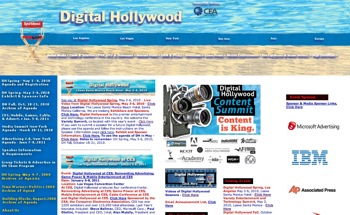There were lots of buzzwords flying around the Loews Santa Monica Beach Hotel over the past week, as the Digital Hollywood conference settled in for a four-day run in a setting overlooking the Santa Monica pier: monetization, transmedia, aggregation, cloud media …
And the consensus was that we’re in a whole new media world these days, with the record industry held up as the poster boy for now not to react to new technology, and the rest of Hollywood still trying to figure out how to make real money out of all these various platforms and devices and techniques.
One person thinks the future of retailing lies in the long tail, selling smaller quantities of more things for a long time; another says there will never be significant money in the long tail. One panelist thinks we’ll see a day when every movie is in 3D; the next one is sure that’ll never happen.
And at the end of more than 100 panels, presentations and workshops at the conference (at which theWrap was one of the sponsors), the question hung in the air: What have we learned?
To conclude the final panel on the final day, which dealt with advertising and video programming for streaming, live broadband and mobile, moderator Gordon Castle actually asked that question directly of the panelists: what have you learned over the course of the conference, and what are you excited about in this new digital world?
 The answers, unsurprisingly, ran a pretty broad gamut, although one common, amusing thread was that Digital Hollywood really needs to update its program, and its website design (right).
The answers, unsurprisingly, ran a pretty broad gamut, although one common, amusing thread was that Digital Hollywood really needs to update its program, and its website design (right).
For John J. Petrocelli, the VP of sales and business development at AEG Digital Media, the most intriguing new trend was 3D; he called it “an infatuation” and said he had no idea how it’ll all play out. But his company has shot 50-odd concerts using the technique, so clearly AEG is as infatuated as anybody else.
Matt Smith, senior director for systems architecture at Inlet Technologies, was puzzled that he’d run across a significant number of old-media types who remained convinced that consumers weren’t going to change.
“There’s this attitude that people still want to sit back in their living rooms and watch content on their TVs, and that won’t change,” he said, shaking his head. For Smith, consumers’ behavior had already changed, and advertisers and media companies were starting to figure out that you can’t just shoehorn your old content into new forms like mobile phones, iPads and other Internet-based devices. “No longer are we trying to adapt the Internet to the content,” he said. “Now we’re trying to adapt the content to the Internet.”
Gannon Hall, the CEO of Kyte, agreed with that take: “The thing I’m most excited about is that the primary delivery mechanism for all media will be Internet-based.” Advertisers, he said, could adapt that and scale their ads to every available platform, and in the end “earn the kind of money that TV does.”
But to do so, he added, they needed to look at each platform separately. “Longform content doesn’t make sense on a BlackBerry,” he said. “High-def content is not going to work on most mobile devices. You need to cater your content to the devices you’re using, or you’re not helping the consumer.”
For Donna Cohen, the VP of business development at Ring World Networks, the biggest problem that remains to be solved isn’t creating content: “There’s lots of good, original low budget content, and you can get it out there, which is half the battle. But how are you going to find the content?”
Old models like broadcast networks, she said, aren’t doing the job. “NBC is no longer a brand,” she insisted. “A brand is a show. I think there needs to be a new network that’s going to bring it all together.”
In the midst of all this, though, one panelist reminded everyone that we’ve heard a lot of this talk before.
“The industry is adopting things faster than we expected in some areas, but much slower in others,” said Michael Papish, the CEO of Media Unbound.
“I’ve been coming here for a long time, and I’m struck by the fact that we’re still talking about the same stuff we’ve been talking about for a number of years.”



